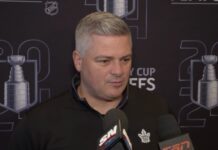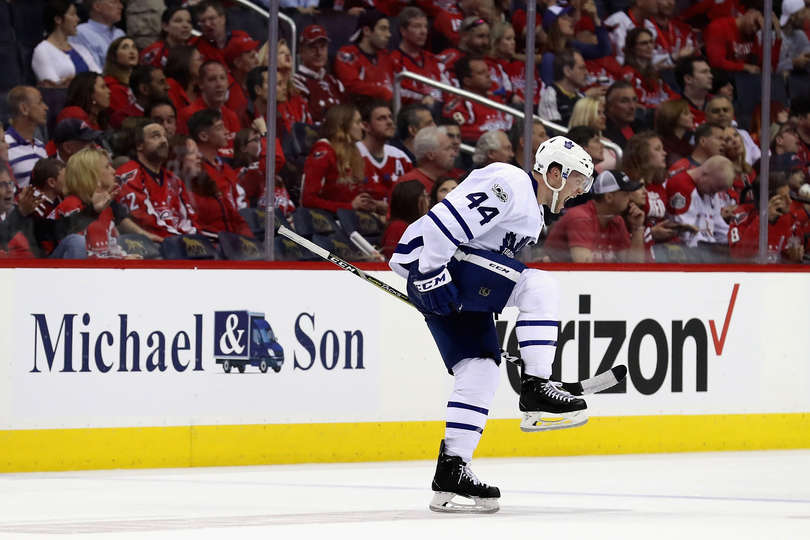Before this series started, if I told you that each of the first two games in Washington would go to overtime and Toronto would return home with a series split, would you have believed me?
So far, this does not look like a series between teams that finished first and eighth in the Eastern Conference respectively. This looks like a series between two top-flight teams – loads of skill, traded chances, big saves, physicality, and good coaching. Through two games, Washington has 94 shots on goal, the Leafs have 88, and the goals are obviously tied up (at 6-6). It doesn’t get much tighter than that.
Mike Babcock said they were going to Washington to win. Maybe nobody believed him before the series, but people are starting to believe now. And believing is a powerful thing.
The Leafs have actually led in-game for a good chunk of the first two games. They scored first in both games and the Capitals never actually led in game one at any point before scoring the overtime winner. After Washington took their first in-game lead of the series in the second period of game two, it lasted 3:19 as the Leafs scored twice in the same period to take it back going into the third period. That 3:19 is the total amount of time the Caps have actually been ahead of the Leafs.
Toronto deserves the split. You could argue they deserve to be up 2-0 in the series.
The Leafs are deeper up front than Washington. The Bozak line has produced in both games, and while they are sheltered defensively, they are dangerous any time they’re in the offensive zone. The fourth line, with the late season addition of Kasperi Kapanen, is producing as well. The Capitals top two lines are fantastic, but they don’t boast that kind of scoring depth. With both games going to overtime, that has been important for Toronto, particularly with their defense so banged up. Both teams rolled their lines for long stretches, but the bottom two lines for Washington didn’t put much of a scare in the Leafs other than a partial breakaway for Brett Connolly.
Washington has been more physical and their defense is far superior to the Leafs. They breakout much cleaner and go off the glass less, which has helped them out-shot attempt the Leafs. Through both games, the Caps lead the Leafs in corsi events for by 186-158 and have outplayed them in third periods as they have worn them down.
The match-ups so far have been the Kadri line vs. Backstrom line, Matthews vs. Kuznetsov, Boyle vs. Eller, and the Bozak line all over. Washington hasn’t really tried to get away from it too much. While Kuznetsov is doing a great job on Matthews so far, the same can be said the other way around. The Kadri line has held the Backstrom line relatively in check, which means depth and special teams take center stage.
That’s where we’re at in a very close series so far, and it plays into the Leafs hands. They’re an underdog that is now trading blows with the President’s Trophy winners. The plot thickens.
But Washington knows this has to be their year to win it with this core. They have too many players going to free agency this summer to start next season with a team this good. They will improve, but so will the Leafs as they get more comfortable in the playoffs.
As Babcock said after the game two win, “You go down two and you’ve got to win four of five. This now sets us up to go home. We’re going to get better and better in the series, obviously, as our confidence grows.”
Buckle up, because the players, fans and city are starting to believe.
Notes
– Washington started with the Beagle line vs. Kadri on the opening faceoff, which was a little different than game one, when they were fine with the top line match-up and didn’t do much to get away from it. Kadri played 8:25 of his 16:08 in ice time against Ovechkin in game one, and 10:52 against Ovechkin of his 24:42 in game two. In game one, after a Washington PP, Babcock put out Kadri after the Leafs killed it off. As soon as his shift was up, Trotz went right back with the Ovechkin line to get them away from Kadri. Babcock noted that for game two. When the Leafs killed off a few penalties, he didn’t put out the Kadri line right after; instead, he waited for the next shift for Ovechkin to come back on and got his match-up. Now that the series is going to Toronto and Babcock gets last change, we’ll see how hard he pushes his match-ups.
– This is a great look from Sean Tierney at average shot distance faced by each goalie so far this playoffs. Andersen has had a huge workload, but so has Holtby. After giving up a few goals he’d probably like to have back in game one, Andersen was fantastic in game two, stopping high danger scoring chances repeatedly and battling through traffic, rebounds and even interference (from TJ Oshie running him). With that type of goaltending, the Leafs are a tough out for anybody.
– One thing that made Washington really dangerous in the game is how active their defense was on the rush as it wore on. Part of that is due to them rolling six throughout a long game – Matt Niskanen played the most at 33:56 and Karl Alzner the least at 26:17, which is a pretty tight range. The Leafs’ first back-checking forward has generally been great, but after that the Washington defense has been beating out the other two forwards for great scoring opportunities and odd man rushes.
– I can’t say enough about the job Morgan Rielly and Jake Gardiner did in this game. Rielly clocked in at 39:56 of ice time, and Gardiner 40:34. They each had a point, combined for eight shots on net, eight hits, 12 blocks, and looked like they could have kept playing. Rielly was far more aggressive this overtime compared to game one and had a few rushes where he was going for it and creating offense. With the rest of the defense made up of guys playing above their head, often Rielly and Gardiner were the only two making clean plays to get the puck out versus going off the glass.
– Don Cherry was right on the game-tying goal in that Connor Brown took the wrong route and should have been up the wall. Ron MacLean mentioned the middle pass, but the center was right behind him for it. Without Brown there, Gardiner has to know to ice that puck, especially with the timeout in their back pocket.
– Make that seven points in eight career playoff games for Jake Gardiner. For my money, he was one of their best players in the Boston series and gave them a completely different dynamic once he came in for game two. He made a goal out of nothing against Washington in game two with a ridiculous spin move and ate minutes all night. For all the flak he gets, he has come up big whenever the Leafs have needed him to. He made a great read in the second period to break up a clear 3v2 by jumping the pass to the high man. Just a week ago, it was Gardiner with the slap pass to Brown for what ended up being the playoff-clinching winner.
– The Leafs have been having trouble entering the zone on Washington while on the PP so far. Instead of the Caps sending a first pressure man, they are backing up and creating a wall along their blue line, which the Leafs have struggled to break through. When they have, they have tried for quick scoring opportunities; those look close, but when they miss, they lead to an easy clear for Washington. As the game progressed, I noticed the Leaf who drops the puck started running a pick on the first Washington penalty killer to create a little more space for the next puck handler. That’s Babcock hockey to a tee.
– I have given him flak throughout the year for playing alongside Matthews, but that doesn’t mean I think Zach Hyman is a weak player (just miscast). He had a hell of a game Saturday as a menace on the forecheck all night to create scoring opportunities, including a centering pass he made to Connor Brown in the slot that almost ended the game. I thought he should have been rewarded with a penalty shot on his shorthanded breakaway as well. Hyman played the third most of any Leafs forward at 25:52, including 5:11 on the penalty kill, and had four shots on net to go with five hits.
– Another playoff point for JVR takes him up to nine in nine playoff games while with the Leafs. In game one, he had seven shots on net and an assist, to go along with a great finish in game two (he almost scored a similar goal later in overtime to end it but put it over the net). He also had the great screen in front on Rielly’s goal.
– 30:38 TOI for Martin Marincin, including 4:11 shorthanded. He has had some teeth-grinding moments, including an uncharacteristically undisciplined penalty, but he also hasn’t played hockey since January 1. Most forget, but Marincin was actually quite good in the second half of a lost season last year. As he has gotten more comfortable, he has looked serviceable, at a minimum. In overtime, he was legitimately good. He’s 6’4 with a long reach which has helped him break up plays, including multiple Washington PP entries in overtime. Stories like this are part of what make the playoffs so exciting.
– Nice to know Matt Martin is a reader of the site. After wondering if he should come out for more scoring, he promptly has a two-assist night.
– Roman Polak will probably become a footnote now that he is out for the year, but I would be remiss if I didn’t say I was sad to see him go out like that. He is done for the season according to Babcock, which is a shame for the team and the player. Polak was playing some good hockey for Toronto for the last few months and has been a big part of their PK this season. He’s a fearless, honest player and is a pending UFA now dealing with a big injury. I think the Leafs will try to upgrade, but there also isn’t much out there. I think Babcock and Lamoriello love him (as well as Hunwick), so it wouldn’t surprise me to see him back. Regardless, I wish him well in his recovery and next career steps.
5 Questions for Game 3
1. Will Nikita Zaitsev be back? This is the first question until he does return, especially now that Polak is out for the year.
2. If Zaitsev is out, will Alexey Marchenko draw in or will the Leafs go off the board? By all accounts, the top four would consist of all lefties – Rielly, Gardiner, Marincin and Matt Hunwick — leaving a third pair of two righties. The Leafs could either spread out their defense a bit (maybe pair Gardiner-Carrick back and Hunwick-Marchenko) to start the game before quickly reducing the bottom two players minutes. Or, they could consider a Marlies call-up like Travis Dermott or Andrew Nielsen to pair with Carrick on the third pair and keep that top four together (it seems unlikely, but it’s still worth a consideration). Marchenko is more experienced than anyone on the Marlies, but at least the Marlies defensemen have been playing lately.
3. How worn down will the Leafs defense be as the series goes on? Rielly is right; they have young legs and a great sports science department. I thought Rielly and Gardiner could have played forever in game two. But they are also human. We’ll see how those two, as well as an older Hunwick (who has played very well so far), hold up against a very physical Caps team throughout this series.
4. How will Babcock play the matchups at home? Is he happy with the Matthews-Kuznetsov battle in particular, or is he going to try and get him away from it to help get Matthews a goal? Playing at home is a completely different story in terms of bench management. How Babcock plays it will be fascinating to me.
5. Will the Leafs adjust on the penalty kill? In the first game, Washington scored on a fluky PP goal so there wasn’t much to say. On Saturday, the Leafs had several breakdowns, as they rotated too quickly on the first one (Hunwick shouldn’t have even been down below the goal line with Polak already there), and they let Carlson walk right in for a pretty easy goal on the second one. Now Polak is out and we’re probably going to start seeing what Gardiner can do on the PK once and for all. Washington has three even strength goals in two games versus the Leafs; if they can shut down this PP, Toronto really has to start liking their odds.

































![Sheldon Keefe Post Game, Leafs 3 vs. Bruins 2: “I loved [the Matthews] line, and I loved a lot about our game all the way through the lineup” Sheldon Keefe, Toronto Maple Leafs post game](https://mapleleafshotstove.com/wp-content/uploads/2024/04/keefe-pg-game-1-100x70.jpg)

